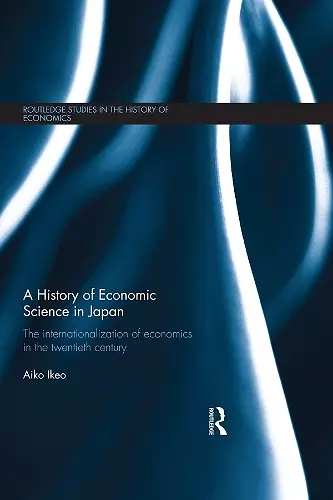A History of Economic Science in Japan
The Internationalization of Economics in the Twentieth Century
Format:Hardback
Publisher:Taylor & Francis Ltd
Published:7th Apr '14
Currently unavailable, and unfortunately no date known when it will be back
This hardback is available in another edition too:
- Paperback£45.99(9781138687523)

Japanese economists began publishing scientific papers in renowned journals including Econometrica in the 1950s and made significant contributions to the sophistication of general equilibrium analysis by an intensive use of a variety of mathematical instruments. They contributed significantly to the transformation of neoclassical economics. This book examines how it became possible for Japanese economists to do so by shedding light on the "professional" discussion of the international gold standard and parity policies in the early twentieth century, the acceptance of "mathematical economics" in the following period, the impact of the establishment of the Econometric Society (1930) and the swift distribution of theory-oriented economics journals since 1930.
This book also includes topics on the historical research of the Japanese foundations of modern economics, the transformation of the economics of Keynes into Keynesian economics, Japanese developments in econometrics, and Martin Bronfenbrenner's visit to Japan in the post-World War II period.
This book provides insight into the economic research done by Japanese scholars in the international context. It traces how, during the period 1900-60, economics was harmonized with mathematics and a standard economics was reshaped on the basis of mathematics thanks to economists' appetite for rigor; and it will help to contribute to existing literature.
"Professor Ikeo provides new insights into Japanese economics and economy, and links them with international milieux by elaborating little-known Japanese contributions to the development of general equilibrium theory, Keynesian economics, and modern and early modern economic ideas. The book is best suitable for postgraduates and scholars, as well as general readers, who are eager to know Japanese competency in intellectual and technological areas." — Atsushi Komine, Professor, Faculty of Economics, Ryukoku University, Japan
"Professor Ikeo provides new insights into Japanese economics and economy, and links them with international milieux by elaborating little-known Japanese contributions to the development of general equilibrium theory, Keynesian economics, and modern and early modern economic ideas. The book is best suitable for postgraduates and scholars, as well as general readers, who are eager to know Japanese competency in intellectual and technological areas." — Atsushi Komine, Professor, Faculty of Economics, Ryukoku University, Japan
"This book explains how Japanese economists, despite their linguistic and physical distance from the Western world where economic science first flourished, were able quickly to absorb modern economic theory and made original contributions from early in the 20th century. The author skillfully reveals that mathematical economics and econometrics in Japan have a longer history than was previously believed and have had a more profound impact than was previously thought on the development of modern economics both inside and outside Japan." — Sangbec Lee, Assistant Professor, Faculty of International Studies, Meiji Gakuin University, Japan
"This book examines the integration of Japanese economic theorists into global networks throughout the 20th century, concentrating mainly on the early 20th century, the 1930s, and the first decades after World War II. The book is a collection of updated essays that Ikeo has written over the last 15 years." - Laura HEIN, Northwestern University
"...this book is surely a worthwhile and pioneering beginning as far as the history of Japanese economic science is concerned." - M. Ali Khan,Johns Hopkins University, Journal of the History of Economic Thought
ISBN: 9780415634274
Dimensions: unknown
Weight: 720g
22 pages